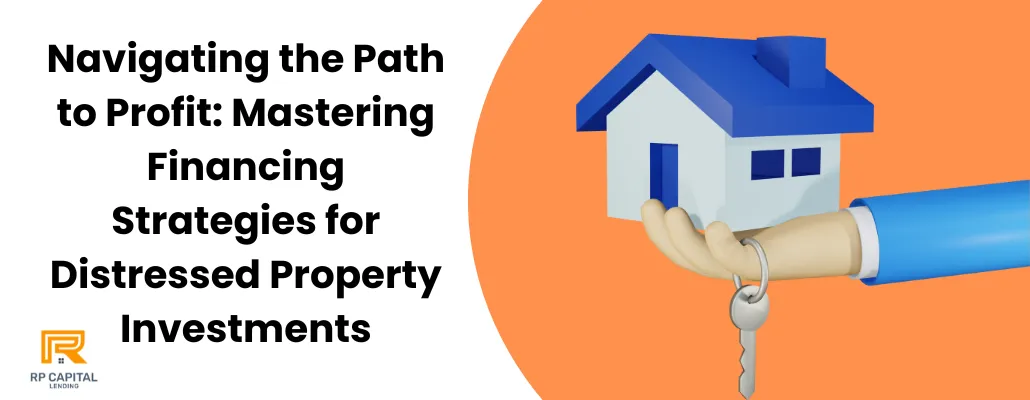Blog

Navigating the Path to Profit: Mastering Financing Strategies for Distressed Property Investments
The allure of distressed properties as a pathway to substantial investment returns is undeniable. Yet, the journey from acquisition to profit is fraught with financial challenges and requires more than just a keen eye for undervalued assets. It demands a nuanced understanding of the financing strategies that can turn potential pitfalls into success stories. Here lies the crux of making distressed property investments work for you.
The Golden Opportunity in Distressed Properties
Imagine stumbling upon a hidden gem, overlooked and undervalued, waiting for someone with vision and tenacity to reveal its true worth. This is the essence of investing in distressed properties. These assets, often marred by financial complications, mismanagement, or deteriorating conditions, present an unparalleled opportunity for the astute investor. The key to unlocking their potential? A strategic approach to financing.
Financing Strategies for Success
1. Harnessing the Power of Hard Money Loans
Hard money loans stand out as a beacon of hope for investors in distressed properties. Unlike traditional financing, hard money lenders focus on the asset's value rather than the borrower's creditworthiness. This pivot opens doors for investors to secure funding quickly, often within days, enabling them to snatch up deals before the competition. The trade-off? Higher interest rates and shorter repayment terms, necessitate a solid exit strategy.
2. Leveraging Private Money Lenders
Imagine having a financial ally, someone who believes in your vision and is willing to back your venture. Private money lenders are just that. These individuals or small groups offer more flexible terms than institutional lenders, making them an invaluable resource for financing distressed properties. The catch? Building a network of trustworthy lenders and convincing them of your project's viability is essential.
3. Creative Financing Techniques
Creative financing encompasses a plethora of strategies designed to overcome traditional lending barriers. Seller financing, lease options, and "subject to" arrangements offer pathways to acquisition with minimal upfront capital. These techniques, while complex, provide a tapestry of options for investors willing to think outside the bank.
4. The Role of Traditional Mortgages
While traditional mortgages may seem an unlikely fit for distressed property investments, they remain a cornerstone of real estate financing. Their applicability hinges on the property's condition and the investor's credit profile. For properties on the cusp of qualifying, securing a conventional loan can offer the most cost-effective financing solution.
5. Government-Sponsored Programs and Grants
Government-sponsored programs and grants can play a pivotal role in financing distressed properties, especially for investors focused on rehabilitation and revitalization. These programs, while often laden with red tape, offer favorable terms that can significantly reduce the financial burden of renovation projects.
FAQs: Financing Distressed Property Investments
1. What makes distressed properties a good investment?
Distressed properties offer the lure of below-market prices and the potential for high returns on investment following successful rehabilitation and resale or rental.
2. Are hard money loans a viable option for beginners?
Yes, hard money loans can be particularly useful for beginners due to their asset-based lending criteria, but it's crucial to understand the terms and have a clear exit strategy.
3. How important is networking in securing private money lending?
Networking is vital. Building relationships with potential investors can open doors to flexible, investor-friendly financing options that are often more accessible and negotiable than traditional bank loans.
4. Can I use a traditional mortgage to finance a distressed property?
It's possible, especially for properties that require minimal repairs to meet lending standards. However, investors should be prepared for more stringent scrutiny of both their finances and the property's condition.
5. What are the risks associated with investing in distressed properties?
The risks include unforeseen repair costs, challenges in securing financing, potential legal issues (like title disputes), and market volatility. A thorough due diligence process is essential to mitigate these risks.
Conclusion: The Path to Mastery
Investing in distressed properties is not for the faint of heart. It requires resilience, creativity, and a deep understanding of financing strategies. By mastering these strategies, investors can navigate the complexities of distressed property investment, transforming challenges into opportunities for remarkable success. Remember, the journey from distressed to dazzling is not just about the properties you invest in; it's about the financial wisdom you apply along the way.
Disclaimer: Loans only apply to non-owner occupied properties. Rates, terms and conditions offered only to qualified borrowers, may vary upon loan product, deal structure, other applicable considerations, and are subject to change at any time without notice.
Copyright © 2025. All Rights Reserved.


